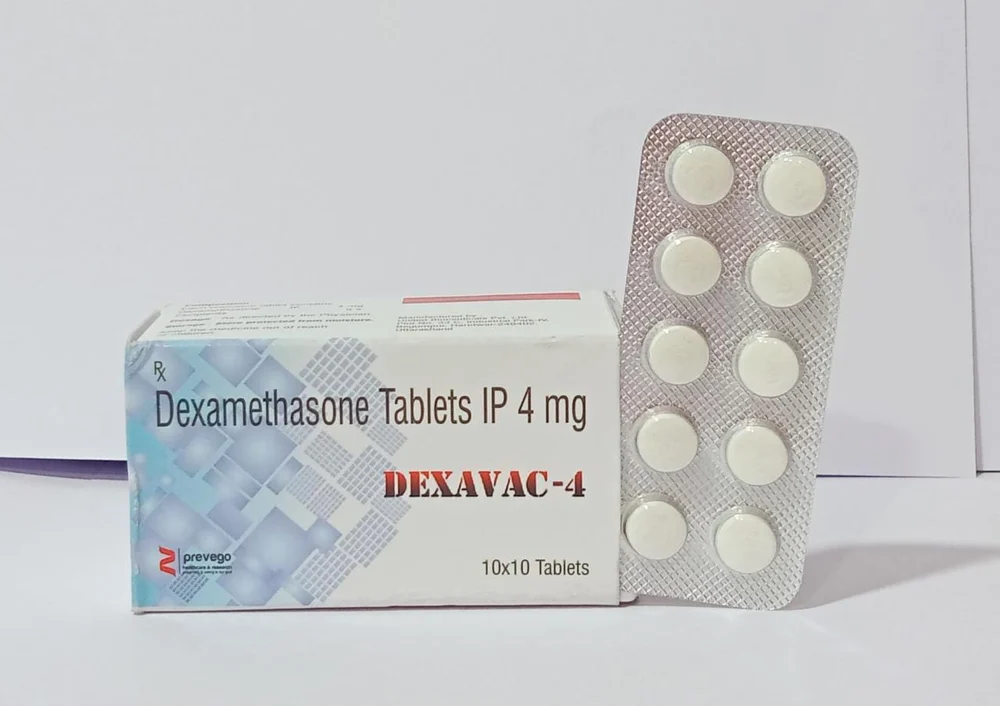Dexamethasone 4 mg Tablet
Description
Dexamethasone 4 mg is an oral medication containing the active ingredient Dexamethasone. It is a highly potent corticosteroid (a type of glucocorticoid), a synthetic hormone similar to those naturally produced by the adrenal glands. It is significantly stronger than the 0.5 mg dose and is used when a more pronounced anti-inflammatory or immunosuppressive effect is required. Dexamethasone acts on the immune system to help reduce swelling, redness, itching, and allergic reactions.
Advantages
- Powerful Anti-inflammatory Action: Provides strong and rapid relief from severe inflammation in various parts of the body.
- Strong Immunosuppressant: Effectively suppresses an overactive immune system, crucial in treating autoimmune diseases and preventing organ rejection.
- Broad Spectrum of Use: Addresses a wide array of severe medical conditions due to its potent and diverse effects.
- Long-Acting: Has a relatively long duration of action, allowing for once-daily dosing in many cases.
- Oral Convenience: Administered orally, offering ease of use compared to injectable forms for long-term or home use.
Uses
Dexamethasone 4 mg is used to treat a wide range of severe inflammatory, allergic, and autoimmune conditions. Some key uses include:
- Severe Allergic Reactions: Management of acute and severe allergic reactions, including anaphylaxis.
- Severe Asthma/COPD Exacerbations: To control acute flare-ups of asthma and chronic obstructive pulmonary disease.
- Inflammatory Conditions: Treatment of severe cases of rheumatoid arthritis, systemic lupus erythematosus, inflammatory bowel disease (Crohn’s disease, ulcerative colitis), and other systemic inflammatory disorders.
- Neurological Conditions: Reduction of cerebral edema (brain swelling) associated with tumors, surgery, or abscesses; management of acute exacerbations of multiple sclerosis.
- Eye and Skin Disorders: Severe inflammatory conditions of the eye and extensive, severe, acute skin diseases (e.g., erythroderma, pemphigus vulgaris).
- Certain Cancers: As part of chemotherapy regimens for cancers like leukemia, lymphoma, and multiple myeloma, often to reduce inflammation, control symptoms, and as an anti-tumor agent itself. Also used to prevent chemotherapy-induced nausea and vomiting.
- Adrenal Insufficiency: Replacement therapy for conditions where the body does not produce enough natural corticosteroids.
- COVID-19: Indicated for adult and adolescent patients (aged 12 years and older with body weight at least 40 kg) who require supplemental oxygen therapy due to COVID-19.
Nature
Dexamethasone is a synthetic glucocorticoid, characterized by its high potency and long duration of action. It exerts its therapeutic effects by modulating gene expression, leading to a reduction in the synthesis and release of inflammatory mediators (such as prostaglandins, leukotrienes, and cytokines) and a decrease in the activity and migration of immune cells (like lymphocytes and macrophages). It also influences carbohydrate, protein, and fat metabolism. The 4 mg dose signifies a strong therapeutic level, suitable for more severe or resistant conditions where lower doses may be insufficient. Its mechanism makes it effective as an anti-inflammatory, immunosuppressant, and anti-allergic agent.
Storage
- Room Temperature: Store Dexamethasone 4 mg tablets at controlled room temperature, typically between 20°C to 25°C (68°F to 77°F). Brief excursions between 15°C and 30°C (59°F and 86°F) are generally acceptable.
- Protect from Light and Moisture: Keep the tablets in their original, tightly closed container or blister pack. It is crucial to protect them from direct light, heat, and excessive moisture. Avoid storing in humid environments like bathrooms.
- Keep Out of Reach of Children: Store the medication in a secure location, well out of the sight and reach of children and pets, to prevent accidental ingestion.
- Do Not Freeze: Freezing can compromise the integrity and effectiveness of the tablets.
- Check Expiry Date: Always check the expiry date on the packaging. Do not use the medication after this date. Properly dispose of any expired or unused medication according to local pharmacy or waste disposal guidelines.

